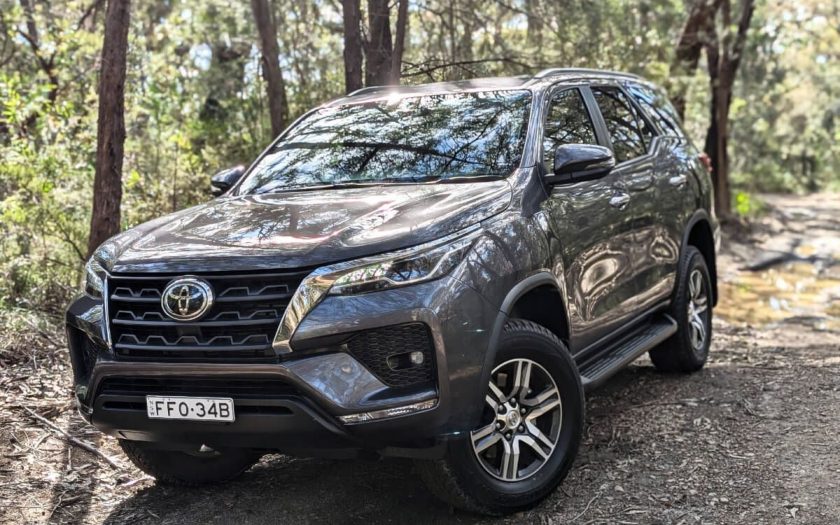Chris Riley tests the 2024 Toyota Fortuner GXL large SUV with pricing, specs, ride and handling, safety, verdict and everything the over-50 driver needs to know.
Summary: The Toyota Fortuner is based on the HiLux. If you’re after a relatively affordable, off-road wagon with diesel power, it meets the brief. But we’d like to see it keep pace with HiLux updates.
2024 Toyota Fortuner GXL large SUV
Pricing: $58,895 (plus on road costs)
Options: metallic paint $600, option pack (leather accented seats, eight-way adjustable front seats) $2500
Warranty: Five-years, unlimited km
Safety: 5-star ANCAP (2019)
Engine: 2.8-litre four-cylinder turbo diesel
Service intervals: first service 5000km/three months, then 10,000km/six months
Power: 150kW @ 3400rpm
Torque: 500Nm between 1600 and 2800 rpm
Transmission: six-speed auto, part time four-wheel drive
Body: 4795mm (long); 1855mm (wide); 1835mm (high)
Build country: Thailand
Kerb weight: 2185kg
Towing capacity: 3100kg
Wheels: 17-inch alloy
Tyres: 265/65R17
Spare wheel: full size
Ground clearance: 225mm
Wading depth: 700mm
Turning circle: 11.6m
Fuel tank: 80 litres
Consumption: 7.6L/100km (diesel)
Consumption on test: 8.7L/100km (700km)
seniordriveraus consumption on test: not tested
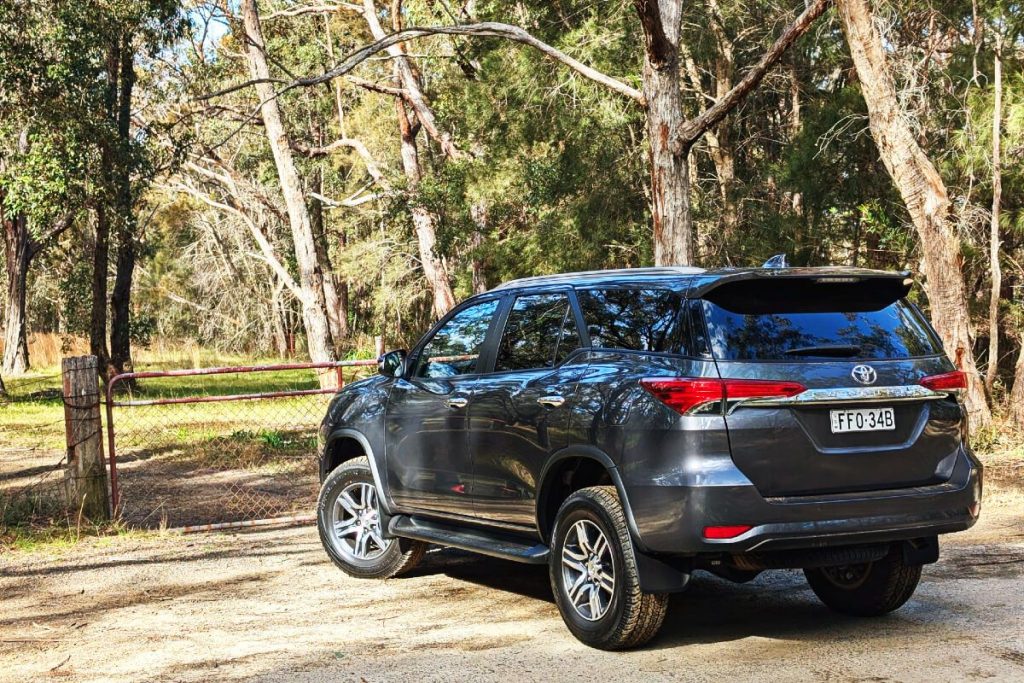
[review]
You don’t hear much about the Toyota Fortuner.
Launched in 2015, Fortuner is the SUV equivalent of the Hilux utility.
Like the Kluger it comes with seven seats, but it’s aimed at a quite different buyer.
Depending on your perspective, it’s either the quiet achiever or the under-achiever, with about half the sales of Prado.
For Toyota, its raison d’etre is or perhaps was to provide a diesel option to Kluger as well as an affordable alternative for those who can’t afford a LandCruiser.
But now that the US-engineered Kluger is available with a hybrid powertrain, you have to wonder whether time is running out for Fortuner – it hasn’t been updated in a while.
With a diesel engine and proper, low-range, four-wheel drive, it is happy to go paddock bashing, but don’t expect it to be as spacious or as comfortable as a proper SUV.
Fortuner competes against the likes of the Isuzu MU-X, Ford Everest and Mitsubishi Pajero Sport.
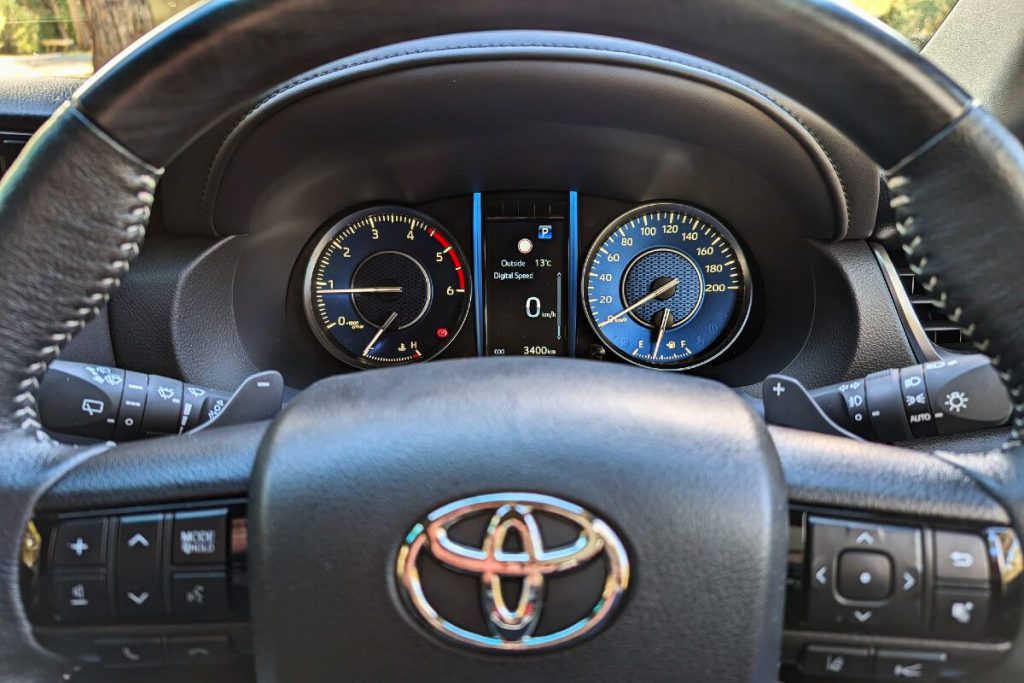
What’s it cost?
There are three grades from which to choose: GX, GXL and Crusade.
All come with the same 2.8-litre turbo diesel and six-speed automatic transmission, the latter with eco and power modes.
Prices start from $53,775 for GX, $58,895 for GXL and $66,755 for Crusade, all before on-road costs.
Our test vehicle, the GXL, was fitted with a $2500 option pack which includes leather-accented seats and eight-way power adjust front seats.
Metallic paint adds $600.
Updated towards the end of 2020, standard equipment includes seven seats, dark-grey cloth trim, front and rear manual air conditioning, side steps, cruise control, front and rear parking sensors, air-conditioned cool box, rear differential lock, 17-inch alloy wheels, and 8.0-inch display audio with Toyota Link.
Mid-range GXL steps up to 17-inch alloys, satellite navigation, paddle gear shifts, keyless smart entry and start, roof rails, reverse parking sensors, fog lights, colour info display, privacy glass and downhill assist control.
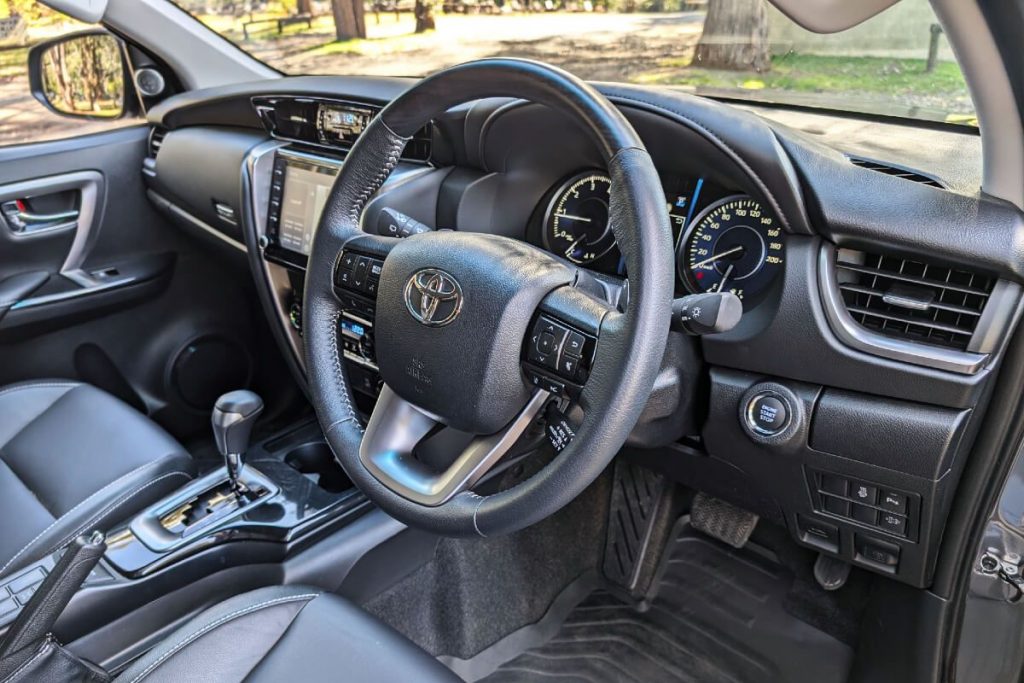
Top-of-the range Crusade comes with 18-inch alloy wheels (including the spare), leather-accented interior (available in fawn or dark brown), dual climate control air-conditioning, auto-dimming rear view mirror, 11-speaker JBL audio, power tailgate, bi-LED headlights, 220V socket, heated front seats and a power-operated driver’s seat.
Infotainment consists of a small 8.0-inch touchscreen, Bluetooth, AM/FM radio with DAB+ digital radio in GXL and Crusade, satellite navigation in GXL and Crusade, steering wheel controls with audio, MID, voice recognition and telephone controls and six-speaker audio.
Crusade adds an 11-speaker JBL premium audio system.
Five-star safety extends to seven airbags, rear view camera, hill start assist and trailer sway control plus Toyota Safety Sense with Active Cruise Control (ACC), Pre-Collision Safety system with pedestrian and cyclist detection, Lane Departure Alert and Road Sign Assist.
Blind spot, Rear Cross Traffic Alert (RCTA) and a panoramic camera are restricted to Crusade.

What’s it go like?
It’s been a while since we last drove Fortuner.
Getting back into the cabin for the first time, we were struck by how dated everything looks – you might even say retro.
Although larger than the original, the touchscreen is small and inset and the instrument dials are mechanical with a small information panel between them.
Woodgrain trim is thankfully absent, but there’s some 70’s style padding that runs down either side of the centre control stack.
Luggage capacity is compromised by old school design that sees the third-row seats, folded and latched to the sides of the cargo area, like they used to do a decade or so ago – taking up lots of valuable space.
The touchscreen is fiddly to use on the go and tracking down your favourite radio station can be hit and miss.
It requires far too much attention, taking your eyes away from the road.
The absence of blind spot warning, almost a given these days, was surprising and even a little frightening (only available with Crusade).

An upgraded 2.8-litre, four-cylinder turbo diesel delivers 150kW of power and 500Nm of torque, the latter from 1600 to 2800 revs.
The diesel is paired with a six-speed auto across the range, with GLX and Crusade adding steering wheel mounted gear change paddles.
A bump in performance comes from a larger new water-cooled heavy-duty ball-bearing turbocharger with a newly developed variable nozzle vane mechanism, as well as measures to increase engine rigidity, cooling and efficiency.
Handling has also benefited from a new variable-flow power-steering pump that offers more assistance at parking speeds while delivering a more direct feel at highway speeds.
A rear differential lock enhances off-road performance.
We’re delighted to see Apple CarPlay and Android Auto are now standard, but they require a cable.
No sign of a wireless charge pad, but what’s this “DPF” message that keeps popping up and staying up until it is dismissed?
On-road performance is surprisingly smooth and strong, given its utility origins, with a turbine-like feel underfoot.
It’s quick off the mark and sails along motorways and secondary roads, ticking over below 2000 revs with plenty of urge down low.
Deceleration can and does result in clunky down changes at times.
The paddle shifts, although a nice touch, are somewhat superfluous because the torquey diesel doesn’t need any help.
It’s off road however that the Fortuner really comes into its own.
With high and low range four-wheel drive, a rear diff lock, hill descent assist, ground clearance of 225mm and a wading depth of 700mm – Fortuner is built to for the rigours of off-road driving.
It’s a part-time four-wheel drive system, so around town the wagon remains front-wheel drive.
Four-wheel drive is engaged via a rotary knob at the bottom of the centre console, with separate switches at the front of the console box to activate Eco and Power drive modes, as well as the rear diff lock.
Heading down our favourite rocky fire trail for a bit of action, the ride is spongy, compliant and absorbent – in fact it feels right at home.
Instead of leaf springs like the ute, the rear of the wagon is sprung with a more sophisticated coil setup, with disc brakes replacing the drums.
You can slip into high range on the go, but engaging low range requires a stop and change to neutral, while the rear diff lock and hill descent assist can be activated when the going gets really tough.
Think Hilux without the problems normally associated with a long tail.
It’s one of the major drawbacks of taking a ute off road, because nine times out of 10, that overhanging tail is going to hit the ground at some point.
Sidesteps and mudflaps are also prone to damage.
We rate Fortuner as a medium to high duty 4WD and if Hilux is unbreakable, then by default that makes Fortuner just as unbreakable.
With an 80-litre tank, claimed fuel consumption is 7.6L/100km and braked towing capacity has been boosted to 3100kg.
Our test vehicle was getting 8.7L/100km after just over 700km of mixed driving.
What we like
- Five-star safety
- Seating for up to seven
- Strong off the line
- Relatively easy to manoeuvre
- Sits relatively flat in corners
- Demonstrates excellent off-road ability
- Active cruise control
- Current speed limit display
- Air conditioning vents for all three rows
- Satnav with speed camera warnings
What we don’t like
- Cabin feels claustrophobic
- Dash looks dated and cluttered
- Fold up third row seats a waste of space
- No blind spot warnings
- Mechanical handbrake
- Just a single USB-A port in the front
What over-50s need to know
Fortuner fills a gap for those looking for a relatively cheap, diesel-powered off-road wagon.
But we’d like to see it keep pace with the Hilux which has been updated many times since 2020 when both were launched.
However, for such tasks as towing, touring and camping, it will tick the box for many readers, especially those who don’t like it too fancy.
Crusade which gets the things missing from the GXL is not too much of a stretch.
seniordriver comments
Toyota’s Fortuner, Ford’s Everest, the Isuzu MU-X and the Mitsubishi Pajero Sport are all based on ute underpinnings, so they’re relatively unsophisticated.
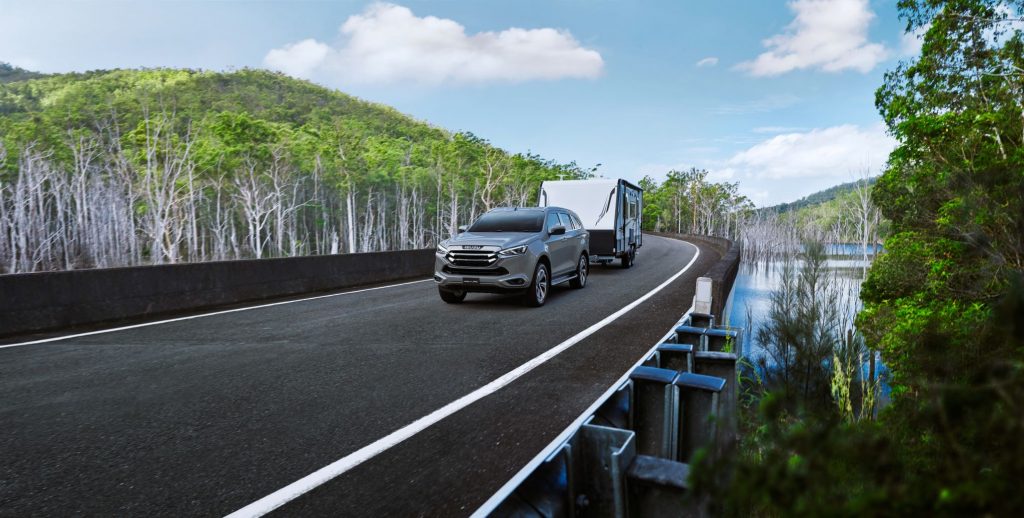
When Chris says it’s the quiet achiever, he isn’t kidding. Even on Toyota’s website, there’s nothing about the latest Fortuner (and that explains why there’s such a shortage of photos on the page).
We fail to see why the Fortuner seems to have been forgotten when it comes to upgrades, especially when compared to the very similar HiLux. As a result, the Fortuner feels slightly dated, especially with the centre console and seats that latch to the sides of the cargo area when folded, and we wonder if it’s about to be delisted. Of course, if you’re after a diesel, it’s far more affordable than the LandCruiser whose price seems to have been creeping up, year on year.
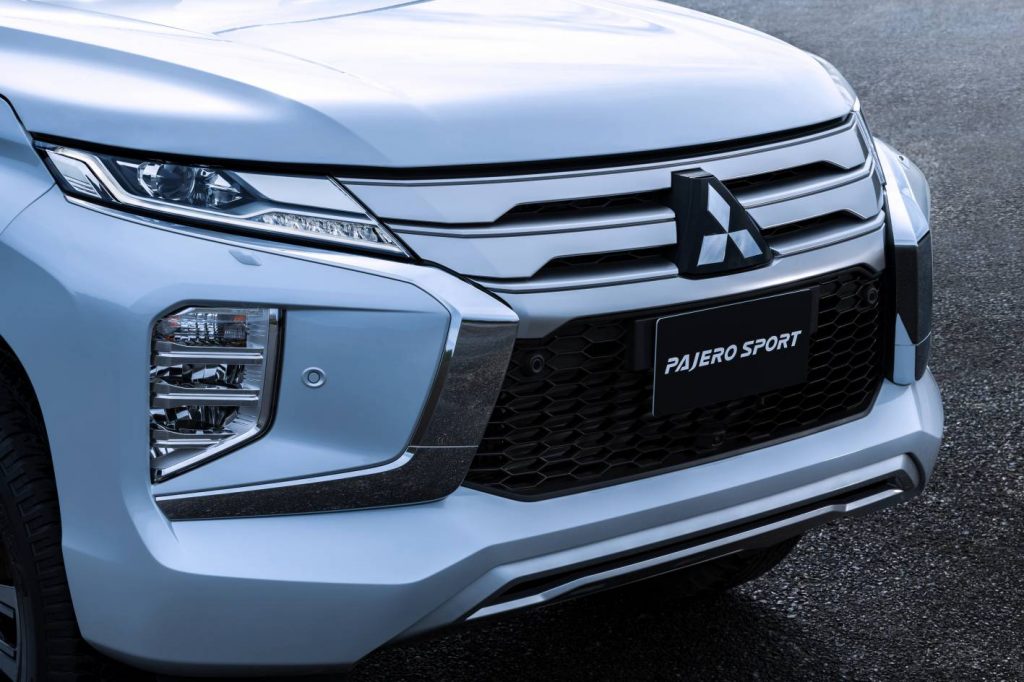
Like most diesels with stop/start, it can shut down and restart with quite a thump.
